ЭТО УЗЫ ЛЮБВИ - ADIYE PREMA BANDHAM
История легендарной песни - Humko Tumse Pyar Kitna
История легендарной песни - Humko Tumse Pyar Kitna
Бог нисходит ради восхождения человека. Как и любое другое восхождение, это восхождение сопровождается страданием. Но так как это страдание имеет цель, оно не только приветствуется верующими, но даже и празднуется имеющими мудрость! И всё же для подавляющего большинства людей, любая боль остаётся не чем иным, как простой обычной болью - причиной невыразимых страданий. Чтобы избавить людей от страданий, вызванных этой болью, Аватар нисходит со Своей миссией. Это то, о чём Бхагаван Баба, наш дорогой Свами, написал в эпохальном письме Своему "старшему брату", Сешаме Раджу.
Beedasadalakaina penubadha tolaginchi lemini bapute prema naku -
"Я связан “работой”, которую люблю: устранять страдания бедных и дарить им то, в чём они нуждаются”.
"Я связан “работой”, которую люблю: устранять страдания бедных и дарить им то, в чём они нуждаются”.
Конечно же, как и каждое высказывание Аватара, этот поэтический оборот тоже имеет несколько значений и смыслов. Но одно значение, безусловно, таково, что Он устраняет страдания и нищих духом, открывая им осознание реальности, в которой они нуждаются. Чтобы это было сделано профессионально и безупречно, миссия Аватара делится на несколько этапов. Сам Свами утверждал, что первые 16 лет Его жизни будут знаменательны в основном Его лилами, или "невинными шутками Господа"; следующие 16 лет - махимами, или сверхъестественными событиями, часто описываемыми как чудеса; а последующие 16 лет - упадешей, или учением. Ни одно из трёх качеств, по Его словам, не будет отсутствовать и во всех остальных периодах. Однако по прошествии этих 48 лет, Божественная жизнь также имела несколько различных фаз, завершённых в более короткие периоды времени. У каждого фазового изменения была стоящая за этим цель, - и удовольствия и страдания, в том числе.
Подобно синусоидальной волне, Свами в своем физическом пребывании на Земле достигал высот близости со Своими преданными, прежде чем спуститься к надирам разлуки и удаленности от них. Это происходило только на физическом плане, и было частью Его генерального плана, дабы научить человечество, что "близость" с Богом имеют для Него большее значение, чем "приближённость" к Нему; и что конечной целью приближённости является достижение близости. И всё же эти фазовые изменения, которые физически забрали Его от преданных, естественно, вызвали больше боли, чем удовольствия.
В 1950 году, когда Свами переехал из Пата Мандира в недавно построенный Прашанти Нилаям, преданные почувствовали, что теперь они потеряли возможность проводить с ним весь день. Прошли годы, и по мере того, как количество народа неуклонно увеличивались, преданным теперь приходилось ждать "времени даршана", чтобы контактировать со Свами, и это казалось "несправедливым". Когда Свами начал строить колледжи, Его время было разделено между студентами и преданными. После окончания строительства колледжа в Прашанти Нилаям, студенты Бриндавана почувствовали, что теперь у них стало "меньше Свами"".
Господь, который даровал нам милость, находясь среди нас, иногда оставлял жаждущих преданных с чувством, что Он ускользает от них (как будто когда-либо для Вездесущего возможно оставить нас без Его присутствия!). Это чувство отчаяния увеличивало преданность, усиливало томление и помогало лучше сосредоточиться на Нём. Может быть, это и было целью этой драмы.
Спустя несколько десятилетий, когда Свами, давая Даршан, ехал в Своей машине по Кульвант холлу, один ненормальный студент встал и протестующим тоном заявил: "Свами, почему Ты прячешься от нас? Ты приезжаешь в машине, и мы с трудом можем видеть Тебя и не получаем радости в наших сердцах". Успокоив его, Свами всё же достаточно решительно напомнил ему: "Никогда не забывай, что Моя близость даруется, как милость. Не принимай её как должное". Но тот же Свами, когда д-р Хислоп спросил Его, будет ли так, что в ближайшие годы будет невозможно находиться рядом с Ним, ответил: “Вовсе нет. Если Баба доволен человеком, тот всё ещё может быть близок с Ним. На всё воля Бабы". Близость нужна всего лишь для того, чтобы заставить нас жаждать этой милости, и Он готов сделать нас самыми дорогими, если на это направлены наши поиски.
Начало пахтанья
Одно из таких фазовых изменений произошло, когда после проживания в мандире (над залом Бхаджан холла в Саи Кульвант холле) в течение более четырех десятилетий, Свами решил перенести Свою резиденцию в зал Пурначандра. Преданные и студенты до этого, в ожидании Его даршана сидели на песке вокруг мандира. Это было так романтично, но теперь Свами будет так "далеко" и бхаджаны будут проходить внутри мандира, где Он будет давать даршаны в зале, который вскоре построят. Хотя все изменения находятся только в сознании воспринимающего и ничего не значат для неизменного Единого, преданные и студенты задавались вопросом, не отдалят ли эти новшества их от Господа.
Этот факт был чем-то большим, нежели просто сменой места жительства, особенно для студентов, поскольку казалось, что их Свами оставил их. Его взаимодействие с ними уменьшилось, и Он показал такую отстраненность, на которую способен только Бог. Студенты не были новичками в подобных "методах лечения". Свами, когда-либо выглядевший расстроенным из-за студентов, часто отдалялся подобным образом. Явное изменение в манере поведения заставляло трепетать сердца всех студентов, и волны садханы охватывали все общежития, - так студенты в массовом порядке попытались вернуть себе любовь Свами. И когда наступал момент, и лёд ломался, каждое слово Свами становилось слаще, каждая улыбка более любящей и каждый жест более тёплым. На самом деле, студентам в этой приближенности к Нему достаточно беглого взгляда, чтобы понимать насколько Он близок. Но ведь Свами только выглядит отчуждённым, отстраненным, безразличным, нелюбящим, занятым и так далее. Говоря иными словами, волнения происходят внутри нас, все перемены случаются в наших сердцах, а мы думаем, что это Он изменился.
Вернёмся к тому времени, о котором шла речь. Казалось, что Свами отдалился и не был готов общаться со студентами или, точнее говоря, говорить с кем бы то ни было. В такие времена над всеми нависали чёрные тучи, и этот раз не был исключением. Свами тоже не наслаждался этими моментами, но Он должен был делать то, что делал - так родители подвергают своего дорогого ребёнка болезненной инъекции, ради обретения сил и выздоровления.
Для его студентов в Путтапарти всё стало более мрачным, поскольку Свами продолжал давать даршаны , но, казалось, полностью "отсутствовал". Письма не брал, интервью не давал. Казалось, Он всецело был поглощён восстановлением и реконструкцией небольшой комнаты за зрительным залом, которая должна была служить божественной обителью . Без возможности взаимодействия со Свами, при Его смене места жительства, всё это выглядело худшим из времён. Казалось, будто зимние холода наступили слишком рано, и время тьмы окутало бывший рай. Но в этом сценарии произошло нечто очень важное - проскочила небольшая искра любви, которая затем переросла в пожар, поглотивший (и продолжающий поглощать) всех на своём пути. Всё началось с интенсивного томления в сердцах студентов, которые боялись, что прежний сценарий может затянуться.
Зарождение песни о вечной любви
Всё началось, когда Дилип Чоудари, один из студентов, служивших в резиденции Свами, послал сообщение Шайлешу Шриваставе. Записка, переданная через студенческий мессенджер, была следующего содержания:
"Можно ли сочинить какую-то особенную специальную песню для грядущего празднования Гуру Пурнимы - песню, выражающую любовь, которую студенты испытывают к своему Свами? Это должна быть песня, которую мог бы спеть каждый ученик. Это должна быть песня, которую должен понимать каждый, и поэтому она должна быть на хинди (национальном языке), на телугу (божественном языке) и английском (универсальном языке). Алап (вступительные строки, исполняющиеся в замедленном ритме без аккомпанемента) должен петь мальчик Шантану (восьмиклассник), поскольку он будет представлять сбой ребёнка, взывающего к нашей Божественной Матери, с просьбой услышать то, что содержится в нашем сердце. Молитва из нашего сердца должна идти к Господу и эхом отзываться в сердцах преданных, чтобы они могли понять, как сильно мы, его студенты, любим его. Мы должны будем спеть эту песню, Когда Свами будет находится на сцене в день Гуру Пурнимы..."
Записка была написана в надежде на то, что подобная песня расколет лёд между Свами и теми, кого Он называл Своей "единственной собственностью". Шайлеш прочитал её и решил, что это прямое послание ему от самого Свами. Хотя Дил (по прозвищу Дилип) написал эту записку сам, она определенно имела в своей основе слова Свами. За несколько недель до Гуру Пурнимы в 1993 году, однажды вечером, после вечерних бхаджанов, когда Бхагаван вернулся в "новую" резиденцию в Пурначандра Ауадитории, Он вызвал Дилипа в свою спальню (на первом этаже, поскольку верхние комнаты ещё не были построены). Затем Свами посетовал на то, как один из преданных сказал Ему:
- Ты уделяешь Своим студентам так много времени . Достойны ли они этой любви и Твоего драгоценного времени? Любят ли они Тебя так же? Следуют ли они Твоим указаниям?”
- Ты уделяешь Своим студентам так много времени . Достойны ли они этой любви и Твоего драгоценного времени? Любят ли они Тебя так же? Следуют ли они Твоим указаниям?”
Дил сел у лотосных стоп Свами и ответил:
"Свами, Ты знаешь, как мы, студенты, любим Тебя”.
"Я знаю, но преданные не знают. Они судят всех студентов за ошибку нескольких".
- Свами, нам не нужно ничьё признание нашей любви к Тебе. Наша любовь только между нашими сердцами и Твоим сердцем. Пока Ты принимаешь нашу любовь и признаёшь её, этого более чем достаточно". Свами оставался серьёзным.
"Свами может чувствовать любовь, находящуюся в сердцах студентов. Кани (однако)... другие тоже должны знать о ней".
На этом разговор закончился, и в сердце Дила вспыхнуло пламя. Он отчаянно хотел сделать что-нибудь, чтобы "заставить Свами чувствовать Себя лучше". Но это может произойти только в том случае, если история любви между студентами и Саи станет очевидной для всех.
В ту ночь, когда Дил закрыл двери и лёг спасть, сердце молило его дать ключ к разгадке. "Как нам отдать всему миру нашу любовь к Господу, очень необычную и существующую только между нами и Им?", он задумался. Вдохновенные мысли, которые в тот момент ему внушил Свами, заставили его написать записку Шайлишу.
На фото: Д-р Шайлеш Шривастава с Бхагаваном
Песня рождается - Снова Правеша, а не Прашава
Шайлеш был учителем физики в школе и колледже Свами. Но он также был известен как прекрасный композитор и блестящий музыкант-фисгармоник. Поскольку до праздника Гуру Пурнима оставалось всего несколько дней, он немедленно начал писать новую песню. Это был спонтанный поток изнутри, и вскоре слова песни на хинди были готовы. Шайлеш добавил ещё пару строк на английском языке.
Humko Tumse Pyar Kitna (Как сильно мы любим Тебя...)
Sai Tum Hi Jante Hain (...Ты Одни знаешь об этом, дорогой Саи..)
Sason Ki Dhadkan Tum Ho Sai (...Саи, Ты - ритм нашего дыхания...)
Tum Hamare Pran Ho (...Ты - наша жизнь...)
Humko Tumse Pyar Hain. (...Мы так любим Тебя...)
We love You dearest Sai, we love You.
We love You dearest Sai, we love You.
Мы любим Тебя, дорогой Саи, мы любим Тебя.
Мы любим Тебя, дорогой Саи, мы любим Тебя.
Шайлеш хотел, чтобы песня имела строки на хинди, английском и телугу. Затем он обратился к своему коллеге-учителю 12-го класса, Сатишу Бабу, родным языком которого был телугу. Казалось, всеми действиями руководила Божественная рука, когда в течение часа Сатиш Бабу проник в глубины своего сердца и придумал необходимые строчки. Он сидел перед фотографией Свами и наполнял своё сердце молитвой: "Свами, это слова для Тебя. Пожалуйста, дай их мне в том виде, в каком они понравятся Тебе”. После этой молитвы пришли следующие слова:
Neevu Leni Ma Jeevanam (Наша жизнь без Тебя...)
Neeru Leni Chepa Vedanam (...похожа на положение рыбы, выброшенной из воды...)
Nee Sannidhe Maku Pennidhi (...Близость к Тебе - самое большое наше богатство...)
Needu Choope Prana Samanam (.. Один Твой взгляд так же дорог, как сама жизнь...)
Neeku Maku Oke Bandhamu (...Только одна связь существует между Тобой и нами...)
Adiye Prema Bandhamu .... - и это Узы Любви).
У Шайлеша оставалось менее суток, чтобы сочинить мелодию. Он сидел до поздней ночи 1-го июля, сочиняя мелодию. Гуру Пурнимa был уже 3-го июля, совместная репетиция песни для всех студентов была назначена на утро 2-го июля. Шайлеш завершил сочинение мелодии для частей песни на хинди и английском языках, полагая, что мелодию для части на телугу можно будет придумать перед репетицией на следующий день! Это было ошибкой. Но минуточку! Действительно ли это было ошибкой, или только выглядело как "ошибка", используемая Божественностью для какой-то особой цели? На следующее утро, когда сессия бхаджанов в Мандире была завершена, было почти 9:30 утра. До начала совместной репетиции оставалось меньше часа. Шайлеш ещё не придумал мелодию для части песни на телугу. Отчаявшись из-за нехватки времени, он обратился за помощью к другому учителю, Сундару Кумару, который также был пылким преданным и певцом. "Давайте попробуем вместе закончить эту песню, м-р Кумар", - сказал Шайлеш.
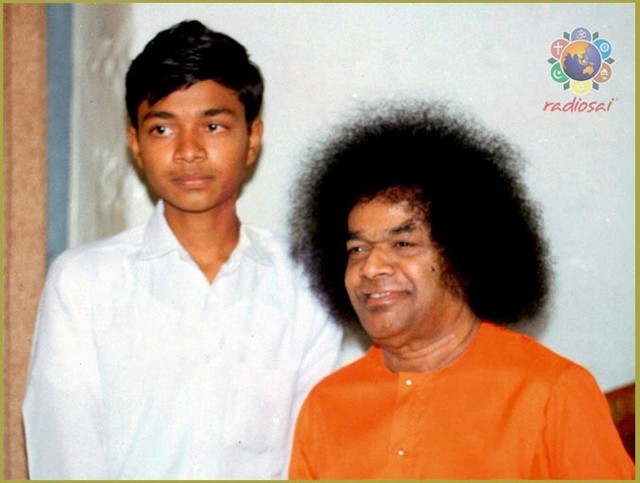
Студенты уже начали собираться в актовом зале института для репетиции, а Шайлеш и Кумар ещё торопливо заканчивали сочинение мелодии песни. Кумар наскоро репетировал части на хинди и английском. Часть Телугу всё ещё была не закончена, и оставалось менее 15 минут до начала репетиции. Шайлеш спонтанно спел мелодию для первой строки: "Neevu Leni Ma Jeevanam".
Кумар, казалось, был в Божественном резонансе, когда так же спонтанно пропел следующую строку: "Neeru Leni Chepa Vedanam".
Дуэт продолжился, когда Шайлеш подхватил: ”Nee Sannidhe Maku Pennidh " .
Не желая отставать, Кумар импровизировал: "Neeku Choope Prana Samanam... Neeku Maku Oke Bandhamu".
Последняя строчка была не укладывалась в размер! Что же делать?
Именно в этот момент они получили срочную весточку от начальника, который сказал, что почти шестьсот студентов ждут занятия. Вдохновлённый Кумар, казалось, только что произнёс последнюю строчку - " Adhiye Prema Bandhamu ". Ритма не было, но он достиг превосходного крещендо.
Так как для обсуждения или дебатов не было времени, они согласились на эту мелодию и направились в аудиторию.Теперь, оглядываясь назад, можно сказать, что это было невероятным чудом, что самые пронзительные строки вечной золотой песни были написаны за считанные минуты! Шайлеш годы спустя вспоминал: "Это было так, как будто Свами, который дал вдохновение и слова песни, хотел, чтобы мелодия была красивой в своей простоте. Но эта простота была бы потеряна, если бы было время подумать. Таким образом, Мастер времени зажал своих детей в рамках нехватки времени, чтобы простая красота и красивая простота песни были сохранены!”
Таким образом, песня родилась спонтанно и практически без усилий. Подобно рождению Аватара, песня также родилась через Правешу (непорочное зачатие), а не Прашаву (телесное оплодотворение).
Шайлеш был учителем физики в школе и колледже Свами. Но он также был известен как прекрасный композитор и блестящий музыкант-фисгармоник. Поскольку до праздника Гуру Пурнима оставалось всего несколько дней, он немедленно начал писать новую песню. Это был спонтанный поток изнутри, и вскоре слова песни на хинди были готовы. Шайлеш добавил ещё пару строк на английском языке.
Humko Tumse Pyar Kitna (Как сильно мы любим Тебя...)
Sai Tum Hi Jante Hain (...Ты Одни знаешь об этом, дорогой Саи..)
Sason Ki Dhadkan Tum Ho Sai (...Саи, Ты - ритм нашего дыхания...)
Tum Hamare Pran Ho (...Ты - наша жизнь...)
Humko Tumse Pyar Hain. (...Мы так любим Тебя...)
We love You dearest Sai, we love You.
We love You dearest Sai, we love You.
Мы любим Тебя, дорогой Саи, мы любим Тебя.
Мы любим Тебя, дорогой Саи, мы любим Тебя.
Шайлеш хотел, чтобы песня имела строки на хинди, английском и телугу. Затем он обратился к своему коллеге-учителю 12-го класса, Сатишу Бабу, родным языком которого был телугу. Казалось, всеми действиями руководила Божественная рука, когда в течение часа Сатиш Бабу проник в глубины своего сердца и придумал необходимые строчки. Он сидел перед фотографией Свами и наполнял своё сердце молитвой: "Свами, это слова для Тебя. Пожалуйста, дай их мне в том виде, в каком они понравятся Тебе”. После этой молитвы пришли следующие слова:
Neevu Leni Ma Jeevanam (Наша жизнь без Тебя...)
Neeru Leni Chepa Vedanam (...похожа на положение рыбы, выброшенной из воды...)
Nee Sannidhe Maku Pennidhi (...Близость к Тебе - самое большое наше богатство...)
Needu Choope Prana Samanam (.. Один Твой взгляд так же дорог, как сама жизнь...)
Neeku Maku Oke Bandhamu (...Только одна связь существует между Тобой и нами...)
Adiye Prema Bandhamu .... - и это Узы Любви).
У Шайлеша оставалось менее суток, чтобы сочинить мелодию. Он сидел до поздней ночи 1-го июля, сочиняя мелодию. Гуру Пурнимa был уже 3-го июля, совместная репетиция песни для всех студентов была назначена на утро 2-го июля. Шайлеш завершил сочинение мелодии для частей песни на хинди и английском языках, полагая, что мелодию для части на телугу можно будет придумать перед репетицией на следующий день! Это было ошибкой. Но минуточку! Действительно ли это было ошибкой, или только выглядело как "ошибка", используемая Божественностью для какой-то особой цели? На следующее утро, когда сессия бхаджанов в Мандире была завершена, было почти 9:30 утра. До начала совместной репетиции оставалось меньше часа. Шайлеш ещё не придумал мелодию для части песни на телугу. Отчаявшись из-за нехватки времени, он обратился за помощью к другому учителю, Сундару Кумару, который также был пылким преданным и певцом. "Давайте попробуем вместе закончить эту песню, м-р Кумар", - сказал Шайлеш.

Студенты уже начали собираться в актовом зале института для репетиции, а Шайлеш и Кумар ещё торопливо заканчивали сочинение мелодии песни. Кумар наскоро репетировал части на хинди и английском. Часть Телугу всё ещё была не закончена, и оставалось менее 15 минут до начала репетиции. Шайлеш спонтанно спел мелодию для первой строки: "Neevu Leni Ma Jeevanam".
Кумар, казалось, был в Божественном резонансе, когда так же спонтанно пропел следующую строку: "Neeru Leni Chepa Vedanam".
Дуэт продолжился, когда Шайлеш подхватил: ”Nee Sannidhe Maku Pennidh " .
Не желая отставать, Кумар импровизировал: "Neeku Choope Prana Samanam... Neeku Maku Oke Bandhamu".
Последняя строчка была не укладывалась в размер! Что же делать?
Именно в этот момент они получили срочную весточку от начальника, который сказал, что почти шестьсот студентов ждут занятия. Вдохновлённый Кумар, казалось, только что произнёс последнюю строчку - " Adhiye Prema Bandhamu ". Ритма не было, но он достиг превосходного крещендо.
Так как для обсуждения или дебатов не было времени, они согласились на эту мелодию и направились в аудиторию.Теперь, оглядываясь назад, можно сказать, что это было невероятным чудом, что самые пронзительные строки вечной золотой песни были написаны за считанные минуты! Шайлеш годы спустя вспоминал: "Это было так, как будто Свами, который дал вдохновение и слова песни, хотел, чтобы мелодия была красивой в своей простоте. Но эта простота была бы потеряна, если бы было время подумать. Таким образом, Мастер времени зажал своих детей в рамках нехватки времени, чтобы простая красота и красивая простота песни были сохранены!”
Таким образом, песня родилась спонтанно и практически без усилий. Подобно рождению Аватара, песня также родилась через Правешу (непорочное зачатие), а не Прашаву (телесное оплодотворение).
Он тот, кто делает, и тот, кто наслаждается
Начались репетиции, и все студенты из школы и колледжа были обучены песне. Именно в этот момент студент, который был частью музыкальной группы, Раджеш Сингх указал Шайлешу, - Сэр, как это может быть "Сасон Ки Дхадкан"? Это должно быть биение сердца, а не дыхание. "Сразу же произошло изменение текста, и третья строка песни теперь стала Dilon Ki Dhadkan Tum Ho Sai (Саи, Ты ритм нашего сердца - Воистину само наше сердцебиение).
По мере продолжения сессии, Шайлеш чувствовал, что, вероятно, будет трудно синхронизироваться и петь последнюю строку вместе, поскольку ей не хватало ритма. Кумар тоже согласился. Но их ждал приятный сюрприз! Вся группа из 600 с лишним мальчиков пела абсолютно в унисон, как будто последняя строка была синхронизирована с незримым ритмом самой Вселенной. Как они могли не спеть эту песню, которая провозглашала связь с их Свами? Сама репетиция была такой захватывающей. Несмотря на то, что внешне Свами держался на расстоянии, теперь все чувствовали, что в этот день Свами присутствует среди них. (И действительно, так оно и было, как оказалось позже).
Когда подошёл вечер Гуру Пурнимы, Дилу сообщили, что песня группы готова и все ученики готовы спеть её, как только Бхагаван выйдет на сцену. Теперь возникала дилемма. Должен ли он сообщить Бхагавану перед этим о песне группы или следует удивить Его, просто начав её петь?
Скорее всего, если они удивят Бхагавана песней, не сообщив заранее, Бхагаван может остановить песню взмахом руки! Тогда все усилия пойдут напрасно, и все ученики будут разочарованы и опечалены. Но если Дил расскажет Бхагавану о песне, то Свами может расстроиться, так как разговор в Его комнате был приватным. Вдобавок ко всему, сэр КБР Прасад, отвечавший за аудиосистему, не включал микрофоны без предварительного разрешения Свами!
Снова и снова, в своём сердце Дил молился Свами, и решение пришло через Саинатха! Саинатх был ещё одним выпускником, который служил Свами, но не был посвящён ни в разговор, ни в текст записки. "Саинатх, студенты подготовили песню. Можете ли вы молить Свами от их имени, прежде чем Он выйдет на сцену?
Саинатх согласился и попросил разрешения у Свами, когда тот уже готовился выйти на сцену. Реакция Свами была непринуждённой и искренней: "Aa, padukomanu. Kottademi kadu, nenu vinnanu idivaraku (Да, скажите им петь. Для Меня это не новость. Я слышал это)".
Только теперь, оглядываясь назад, стало понятно, что именно Свами помог задумать песню, сочинить её и спеть через Своих студентов - Его инструменты.
Когда подошёл вечер Гуру Пурнимы, Дилу сообщили, что песня группы готова и все ученики готовы спеть её, как только Бхагаван выйдет на сцену. Теперь возникала дилемма. Должен ли он сообщить Бхагавану перед этим о песне группы или следует удивить Его, просто начав её петь?
Скорее всего, если они удивят Бхагавана песней, не сообщив заранее, Бхагаван может остановить песню взмахом руки! Тогда все усилия пойдут напрасно, и все ученики будут разочарованы и опечалены. Но если Дил расскажет Бхагавану о песне, то Свами может расстроиться, так как разговор в Его комнате был приватным. Вдобавок ко всему, сэр КБР Прасад, отвечавший за аудиосистему, не включал микрофоны без предварительного разрешения Свами!
Снова и снова, в своём сердце Дил молился Свами, и решение пришло через Саинатха! Саинатх был ещё одним выпускником, который служил Свами, но не был посвящён ни в разговор, ни в текст записки. "Саинатх, студенты подготовили песню. Можете ли вы молить Свами от их имени, прежде чем Он выйдет на сцену?
Саинатх согласился и попросил разрешения у Свами, когда тот уже готовился выйти на сцену. Реакция Свами была непринуждённой и искренней: "Aa, padukomanu. Kottademi kadu, nenu vinnanu idivaraku (Да, скажите им петь. Для Меня это не новость. Я слышал это)".
Только теперь, оглядываясь назад, стало понятно, что именно Свами помог задумать песню, сочинить её и спеть через Своих студентов - Его инструменты.
Г-н с Кумар (стоит, получая одежду от Бхагавана) после одного из выступлений во время дня рождения Свами.
Песня и реакция на неё
В тот незабываемый день Свами вошёл в зал и сел на веранде. Было несколько выступлений: доктора Майкла Гольдштейна, мистера Джеймса Синклера и мистера Аджита Хаксара. Речи были обычной практикой перед выступлением Бхагавана. Однако перед прямо перед Его выступлением умоляющий голос маленького ребёнка, обращенный к матери, наполнил воздух:
"Sunlo.... Dil Ki Pukar... Sunlo... (Прислушайтесь к зову сердца... Слушай его)
Свами сидел неподвижно. Он разрешил ученикам петь и поэтому не удивился. Но остальная собравшаяся аудитория не ожидала этого, и все, затаив дыхание, смотрели, как студенты восклицают: “О! Как сильно мы любим Тебя, Господь! - Humko Tumse Pyar Kitna.”
Свами сидел, покачиваясь под мелодию, изливающуюся любовью отовсюду. Свами выглядел отрешённым, но отрешённым в другом смысле - в том, в котором любили студенты. Преданные, казалось, чувствовали себя неважно, так как многие не понимали слов песни. Именно в этот момент зазвучали строки на английском: "Мы любим Тебя, дорогой Саи, мы любим Тебя!”
"Sunlo.... Dil Ki Pukar... Sunlo... (Прислушайтесь к зову сердца... Слушай его)
Свами сидел неподвижно. Он разрешил ученикам петь и поэтому не удивился. Но остальная собравшаяся аудитория не ожидала этого, и все, затаив дыхание, смотрели, как студенты восклицают: “О! Как сильно мы любим Тебя, Господь! - Humko Tumse Pyar Kitna.”
Свами сидел, покачиваясь под мелодию, изливающуюся любовью отовсюду. Свами выглядел отрешённым, но отрешённым в другом смысле - в том, в котором любили студенты. Преданные, казалось, чувствовали себя неважно, так как многие не понимали слов песни. Именно в этот момент зазвучали строки на английском: "Мы любим Тебя, дорогой Саи, мы любим Тебя!”
С восторженной радостью все присоединились к прославлению вечной связи человека и Бога. Затем наступил кульминационный момент - слова на телугу, завершившиеся незабываемым крещендо. Свами был в восторге! Казалось, Он хотел всех обнять. Его глаза увлажнились, а сердце растаяло. И в это мгновение худшие времена уступили место лучшим временам. Зима отчаяния уступила место весне надежды, а время тьмы исчезло под напором времени света!
Это был трогательный момент, и все сердца были полны любви к Свами. Свами тоже был тронут. На самом деле, Свами даже сослался на песню позже, в Своей речи на Гуру Пурниму, а также подтвердил Свою осведомлённость о молитвах и практиках студентов в период, когда они думали, что Свами отдалился от них и огорчился.
Он сказал буквально следующее: "А теперь о наших студентах, - вы можете сравнить их с кем угодно, но вы нигде не найдете никого похожего на них. Наши студенты ежедневно молятся, соблюдают посты и созерцают день и ночь, не принимая ни еды ни воды... Они в тоске и отчаянии. Разве в мешке с рисом не может быть несколько камешков? В большой группе может быть несколько паршивых овец. Из-за нескольких грешников неправильно наказывать всех учеников. Наши студенты подобны чистому благородному золоту. Они готовы на всё ради Свами. Вы все слышали песню, которую пел молодой парень в начале мероприятия. Он пел: "Мы готовы предложить Тебе свою жизнь, Бхагаван".
Он сказал буквально следующее: "А теперь о наших студентах, - вы можете сравнить их с кем угодно, но вы нигде не найдете никого похожего на них. Наши студенты ежедневно молятся, соблюдают посты и созерцают день и ночь, не принимая ни еды ни воды... Они в тоске и отчаянии. Разве в мешке с рисом не может быть несколько камешков? В большой группе может быть несколько паршивых овец. Из-за нескольких грешников неправильно наказывать всех учеников. Наши студенты подобны чистому благородному золоту. Они готовы на всё ради Свами. Вы все слышали песню, которую пел молодой парень в начале мероприятия. Он пел: "Мы готовы предложить Тебе свою жизнь, Бхагаван".
Когда через несколько дней Свами приехал в Бриндаван, студенты "удивили" его этой песней (а также несколькими другими песнями), вставленными в середину сессии бхаджанов. Широкая улыбка сияла на божественном лице. Эта сессия бхаджанов ознаменовала окончание периода, когда Свами держался подальше от мальчиков! На самом деле, несколько раз, Свами Сам начал просить спеть эту песню, задавая сладкий вопрос:
"Humko Tumse Pyar Kitna? (Эти слова можно перевести и так: "Сколько любви Я имею к тебе?")
Мальчиков не нужно было подгонять, чтобы они разразились песней.
"Humko Tumse Pyar Kitna? (Эти слова можно перевести и так: "Сколько любви Я имею к тебе?")
Мальчиков не нужно было подгонять, чтобы они разразились песней.
Стоит ли удивляться, что на одной из церемоний последнего Созыва, проходящего в Его физическом присутствии, когда Бхагаван попросил студентов спеть песню, они разразились "Humko Tumse Pyar Kitna"? И уже через несколько строк сердце каждого было переполнено любовью к Свами. Как может Божественное сердце противостоять такой любви? Оно тоже начало переполняться, и Свами пропел на телугу - Adiye Prema Bandhamu. Это было так, как если бы Он тоже подтверждал Своим студентам:
"Моя жизнь без вас подобна состоянию рыбы без воды. Моё самое большое богатство - близость к вам, и ваши взгляды на Меня означают саму жизнь. Есть только одна связь, которая держит нас вместе. И это - Узы Любви”.
"Моя жизнь без вас подобна состоянию рыбы без воды. Моё самое большое богатство - близость к вам, и ваши взгляды на Меня означают саму жизнь. Есть только одна связь, которая держит нас вместе. И это - Узы Любви”.
Именно через мрак безнадежности сияет свет благодати, именно горечь позволяет нам ценить сладость. Именно на расстоянии мы обнаруживаем близость. Но секрет в том, чтобы желать Бога и в боли, и в удовольствии. Когда мы ищем Бога только для наслаждения, Он может благословить нас, но периоды страдания ослабят нашу хватку. Однако когда мы ищем Бога, ради Самого Бога, моменты боли заставляют нас сжимать Его руку ещё крепче. Эта песня была выражением той самой твёрдой хватки, глубочайшей жажды и слёзной мольбы. Каждый раз, когда мы чувствуем растущее расстояние между нами и Свами, мы должны разразиться этой мелодией, и пусть образ Свами, отвечающего на эти сердечные слова, предстанет перед нашим умом и успокоит больное сердце!
В этом году эта вечная мелодия празднует свой серебряный юбилей, и это еще один знак любви Свами для того, чтобы мы были вдохновлены желанием поделиться историей этой песни теперь, когда заканчивается год и когда бывшие студенты Свами собрались, чтобы отпраздновать ежегодную "Встречу выпускников Према Бандхам (Узы Любви)".
Тысячи студентов высказали свою невыразимую любовь к Свами через эту мелодию. Тысячи преданных, говорящих на разных языках, находили удовольствие в том, чтобы петь Ему её. И это на самом деле особая песня об особой связи, которую Свами так милостиво позволил нам создать с Ним. Пусть эту песню споют еще миллионы людей и множество поколений. И мы молимся, чтобы с каждым днём наша любовь к Свами становилась всё более и более истинной, высказанной через эту мелодию!
Песня:
Humko Tumse Pyar Kitna (Как сильно мы любим Тебя...)
Sai Tum Hi Jante Hain (Ты Одни знаешь об этом, дорогой Саи)
Sason Ki Dhadkan Tum Ho Sai (Саи, Ты - ритм нашего дыхания)
Tum Hamare Pran Ho (Ты - наша жизнь)
Humko Tumse Pyar Hain. (Мы так любим Тебя)
We love You dearest Sai, we love You.
We love You dearest Sai, we love You.
Мы любим Тебя, дорогой Саи, мы любим Тебя.
Мы любим Тебя, дорогой Саи, мы любим Тебя.
Neevu Leni Ma Jeevanam (Наша жизнь без Тебя...)
Neeru Leni Chepa Vedanam (...похожа на состояние рыбы, выброшенной из воды)
Nee Sannidhe Maku Pennidhi (Близость к Тебе - самое большое наше богатство)
Needu Choope Prana Samanam (Один Твой взгляд так же дорог, как сама жизнь)
Neeku Maku Oke Bandhamu (Только одна связь существует между Тобой и нами... -)
Adiye Prema Bandhamu (.... - и это Узы Любви).
Источник: http://media.radiosai.org/journals/vol_16/01DEC18/Humko-Tumse-pyar-kitna.htm?fbclid=IwAR3Qllka6mbIaLk31gEO2fGPUxoJpiZS5qZ-6PeYl4lOqZLAM0pqUjx9zng
Sai Tum Hi Jante Hain (Ты Одни знаешь об этом, дорогой Саи)
Sason Ki Dhadkan Tum Ho Sai (Саи, Ты - ритм нашего дыхания)
Tum Hamare Pran Ho (Ты - наша жизнь)
Humko Tumse Pyar Hain. (Мы так любим Тебя)
We love You dearest Sai, we love You.
We love You dearest Sai, we love You.
Мы любим Тебя, дорогой Саи, мы любим Тебя.
Мы любим Тебя, дорогой Саи, мы любим Тебя.
Neevu Leni Ma Jeevanam (Наша жизнь без Тебя...)
Neeru Leni Chepa Vedanam (...похожа на состояние рыбы, выброшенной из воды)
Nee Sannidhe Maku Pennidhi (Близость к Тебе - самое большое наше богатство)
Needu Choope Prana Samanam (Один Твой взгляд так же дорог, как сама жизнь)
Neeku Maku Oke Bandhamu (Только одна связь существует между Тобой и нами... -)
Adiye Prema Bandhamu (.... - и это Узы Любви).
Источник: http://media.radiosai.org/journals/vol_16/01DEC18/Humko-Tumse-pyar-kitna.htm?fbclid=IwAR3Qllka6mbIaLk31gEO2fGPUxoJpiZS5qZ-6PeYl4lOqZLAM0pqUjx9zng
IT IS THE BOND OF LOVE - ADIYE PREMA BANDHAM
The Story of the Epic Song - Humko Tumse Pyar Kitna
The Descent of God is for the Ascent of Man. Like any other climb, this ascent too is filled with pain but since that pain has a purpose, it is accepted cheerfully by the faithful and, in fact, celebrated by the wise! For the vast majority, however, the pain remains nothing but plain vanilla pain - the cause of untold misery. In order to remove the suffering caused by this pain, the Avatar descends with the Avataric mission. That was what Bhagawan Baba, our dear Swami, penned down in the epochal letter to His ‘elder brother’, Seshama Raju,
Beedasadalakaina penubadha tolaginchi lemini bapute prema naku
“I am attached to a ‘work’ that I love: to remove the sufferings of the poor and grant them what they lack.”
Beedasadalakaina penubadha tolaginchi lemini bapute prema naku
“I am attached to a ‘work’ that I love: to remove the sufferings of the poor and grant them what they lack.”
Of course, like every statement of the Avatar, this poetic statement too has multiple meanings and dimensions. But one meaning is definitely this - that He removes the suffering of the spiritually poor by granting them the awareness of Reality that they lack. To do that in a professional and perfect manner, the Avataric Mission is divided into phases. Swami has Himself stated that His first 16 years will be marked mainly by leelas or “the playful jests of the Lord”, the next 16 by mahimas or the extraordinary happenings often described as miracles, and the subsequent 16 years by upadesh or teaching. None of the three, He said, would be absent in any of the phases. However, beyond 48 years too, the Divine Life had multiple phases seeing completion in shorter periods of time. Every phase-change had a purpose behind it, and naturally, pleasures and pains too.
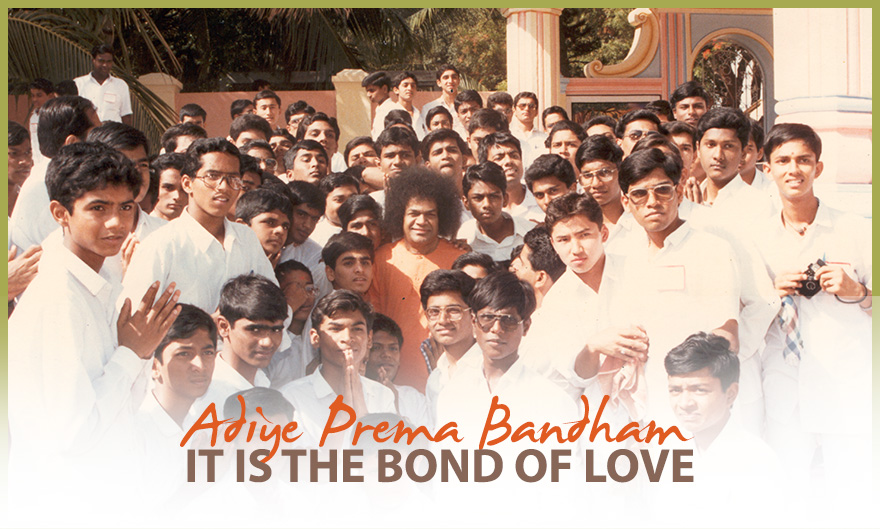 |
Like a sinusoidal wave, Swami too, in His physical sojourn on earth, seemed to reach the heights of proximity and intimacy with His devotees before dipping down to the nadirs of separation and remoteness from them. But this was only in the physical plane and was part of His Master plan to teach humanity that ‘dearness’ to God mattered more than ‘nearness’ to Him; that the ultimate objective of the nearness was also, only to achieve dearness. But still, those phase changes that took Him away physically from the devotees naturally caused more pain than pleasure.
In the 1950 when Swami shifted His residence from the Pata Mandir to the newly built Prasanthi Nilayam, the devotees felt that they have now lost the opportunity to spend the entire day with Him. Years passed and as the crowds steadily increased, devotees now had to wait for 'darshan time' to interact with Swami and that seemed 'unfair'. As Swami began building colleges, His time was now divided among students and devotees. When Swami built the college at Prasanthi Nilayam, the students of Brindavan felt that now they had less of Swami.
The Lord who had gracefully chosen to be in our midst, sometimes left the craving devotees with the feeling that He was slipping away from them (as if it was ever possible for the omnipresent to leave our presence). This feeling of desperation made the devout cling more firmly, pine harder and focus better. May be that was the very purpose of this drama.
Decades later when Swami would give Darshan as He drove in His car around the Kulwant hall, a distraught student got up and remarked protestingly, “Swami, why are You withdrawing Yourself this way? You come in a car and we can hardly see You to our heart's content!” Pacifying him yet being firm Swami reminded him, “Never forget that My proximity is always conferred grace, take it not for granted.” But the same Swami, when asked by Dr Hislop if in the coming years it would be impossible to be near Him, replied, “Not at all. If Baba is pleased with a person he may still be close. That is Baba's will.” The nearness was merely to make us crave for that dearness, and He is every ready to make us dear, if that is what we seek.
The Churning Begins
One such phase change came when Swami chose to shift His residence to the Poornachandra Auditorium after residing in the mandir (above the bhajan hall in the Sai Kulwant Hall) for over four decades. The devotees and students, till then, would sit around the mandir on the sands as they waited for His darshan. That seemed such a poetic setting, but now, Swami will stay 'far away' and would attend bhajans in the mandir and give Darshan in the hall that would be built. Though all change is in the mind of the perceiver and meant nothing to the Changeless One, the devotees and students wondered if this new arrangement would take them further away from their Lord.
It appeared to be more than a simple shift of residence especially for the students, as it seemed their Swami was also being a bit aloof. His interactions with them reduced and He exhibited the deathly detachment that only God is capable of. The students were not new to this treatment. Ever so often Swami would withdraw Himself and seem very upset with the students. The apparent change in demeanour would stir the heart of every student and a wave of Sadhana would sweep the hostels as the students en masse would try to win back their Swami's love. And when the moment would come, and the ice broke, Swami's every word would've become sweeter, every smile more loving and every gesture warmer. In reality, the students would've had a glimpse of dearness, in that nearness. But till then, Swami would seem aloof, detached, uncaring, unloving, occupied and so on. Truly speaking, the stirring happens within, the change takes place in our hearts, and we imagine He has changed.
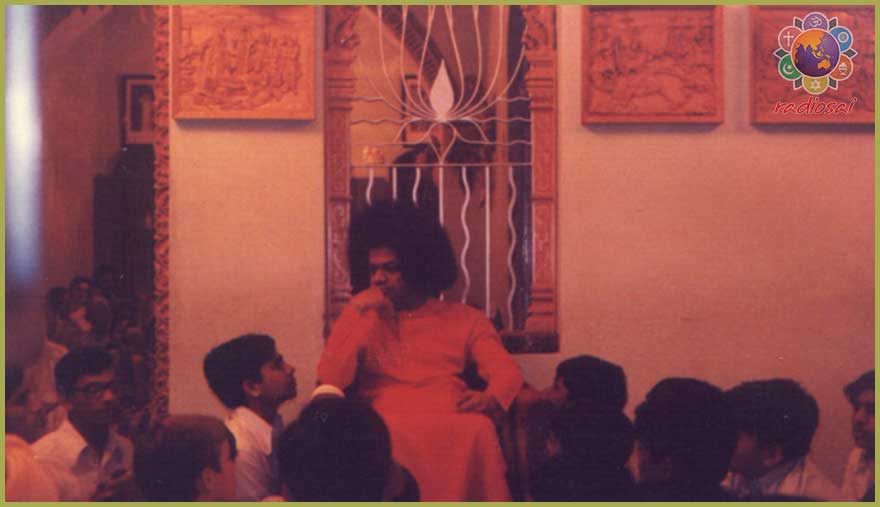 |
Coming back to the time we are referring to. It seemed Swami was distant and was not willing to speak to students or for that matter to anyone. And at such times there would be an invincible shadow over all, and this time was no different. Swami too didn’t seem to enjoy these moments but knew that He had to do what had to be done - just like the parents subject their dear child to the painful prick of a doctor’s needle for strength and protection.
For His students at Puttaparthi, things got bleaker as Swami continued granting darshans but seemed to be totally ‘absent’. No letters were taken nor were there any interviews. He seemed engrossed in the renovation and reconstruction of the small room behind the Auditorium that would serve as the Divine Sanctum. Without interactions with Swami and this shift of residences, it seemed like the worst of times. It was as if the winter of despair had set in early and the season of darkness was enveloping the holy hamlet. But it was in this scenario that something epochal happened - a small spark of love that grew into a conflagration which consumed (and continues to consume) everyone in its wake. It all began with the intense pining in the hearts of students who feared that the scenario might turn out to be the new normal.
Genesis of the song of the Eternal Love Story
It all started when Dilip Choudhary, one of the students serving Swami at the Residence, sent a message to Shailesh Srivastava. The note which a student-messenger carried was surprisingly detailed.
"Can a special song be composed for the upcoming Guru Poornima - a song which would express the love which students have for their Swami? It should be a song that every student can sing. It should be a song that everyone should understand and therefore, it should be in Hindi (the National language), Telugu (the Divine language) and English (the Universal language). The Alap (opening lines sung slowly without beat) should be sung by the boy Shantanu (a 8th grader) as he represents the child crying out to our Divine Mother to listen to what is in our heart. The prayer from our heart should go out to the Lord and echo to touch the hearts of the devotees as well where they can understand how much we, His students, love Him. We should sing this song when Swami is on stage on Guru Poornima..."
The note had been written with the hope that such a song would be the ice-breaker between Swami and what He had claimed as His ‘sole property’. Shailesh read it and decided that it was a direct message to him from Swami Himself. Though Dil (as Dilip was nicknamed) had written the note himself, it definitely had its genesis in Swami's words. A few weeks prior to Guru Purnima in 1993, one evening, after the evening bhajans when Bhagawan returned to the 'new' Poornachandra Auditorium residence, He summoned Dilip to His bedroom (in the ground floor, as the upstairs rooms had not been constructed yet). Swami then lamented about how one of the devotees had asked Him,
"Can a special song be composed for the upcoming Guru Poornima - a song which would express the love which students have for their Swami? It should be a song that every student can sing. It should be a song that everyone should understand and therefore, it should be in Hindi (the National language), Telugu (the Divine language) and English (the Universal language). The Alap (opening lines sung slowly without beat) should be sung by the boy Shantanu (a 8th grader) as he represents the child crying out to our Divine Mother to listen to what is in our heart. The prayer from our heart should go out to the Lord and echo to touch the hearts of the devotees as well where they can understand how much we, His students, love Him. We should sing this song when Swami is on stage on Guru Poornima..."
The note had been written with the hope that such a song would be the ice-breaker between Swami and what He had claimed as His ‘sole property’. Shailesh read it and decided that it was a direct message to him from Swami Himself. Though Dil (as Dilip was nicknamed) had written the note himself, it definitely had its genesis in Swami's words. A few weeks prior to Guru Purnima in 1993, one evening, after the evening bhajans when Bhagawan returned to the 'new' Poornachandra Auditorium residence, He summoned Dilip to His bedroom (in the ground floor, as the upstairs rooms had not been constructed yet). Swami then lamented about how one of the devotees had asked Him,
“You give so much of Your time to Your students. Are they worthy of this love and Your valuable time? Do they love You in return? Do they follow what You instruct them to do?” Dil sat down at Swami's lotus feet and responded,
“Swami, You know how much we – students - love You”.
“I know, but the devotees don’t know. They are judging the entire student community for the mistake of a few."
Dil said confidently, “Swami, we don’t need anyone else’s acknowledgement of our love for You. Our love is from our heart to Your heart. So long as You receive our love and acknowledge it, that’s more than enough." Swami was serious.
“Swami can feel the love that’s in the hearts of the students. Kani (however)... others also should know."
The conversation ended there and there was a fire in Dil's heart. He wanted to desperately do something to 'make Swami feel better'. But that would happen only if the love-story between the students and Sai was made evident.
That night, while Dil slept outside His bedroom door, his heart prayed to Him to give a clue. "How do we convey our Love for the Lord which is so special and one-to-one to the entire world?", he wondered. The inspired thoughts that Swami infused in him at that point in time resulted in the note that he wrote to Shailesh.
“Swami, You know how much we – students - love You”.
“I know, but the devotees don’t know. They are judging the entire student community for the mistake of a few."
Dil said confidently, “Swami, we don’t need anyone else’s acknowledgement of our love for You. Our love is from our heart to Your heart. So long as You receive our love and acknowledge it, that’s more than enough." Swami was serious.
“Swami can feel the love that’s in the hearts of the students. Kani (however)... others also should know."
The conversation ended there and there was a fire in Dil's heart. He wanted to desperately do something to 'make Swami feel better'. But that would happen only if the love-story between the students and Sai was made evident.
That night, while Dil slept outside His bedroom door, his heart prayed to Him to give a clue. "How do we convey our Love for the Lord which is so special and one-to-one to the entire world?", he wondered. The inspired thoughts that Swami infused in him at that point in time resulted in the note that he wrote to Shailesh.
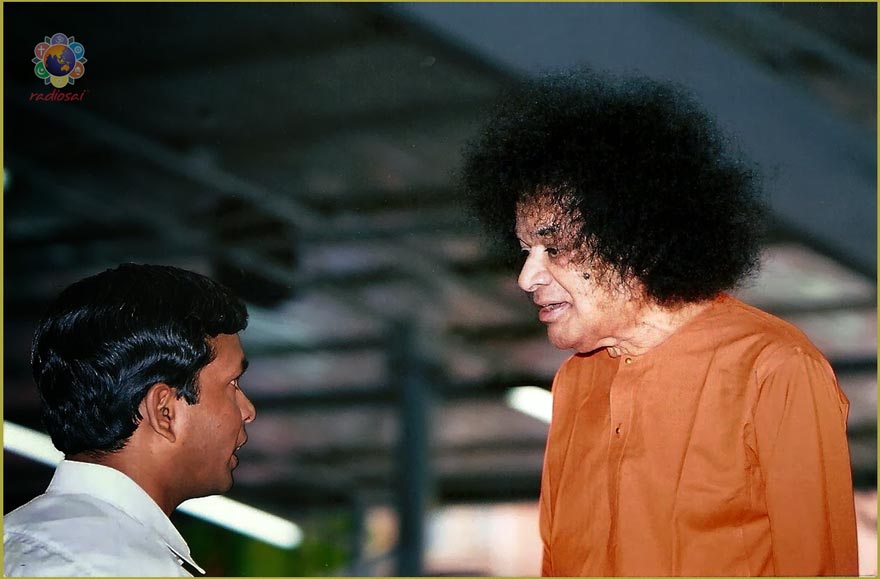 |
| Dr Shailesh Srivastava with Bhagawan |
The song takes birth - again Pravesha and not Prasava
Shailesh was a physics teacher at Swami’s school and college. But he was also known as a beautiful music-composer and a brilliant harmonium-player. Since there were only a few days to go before the Guru Poornima festival, he immediately began writing a new song. It was a spontaneous flow from within and soon, the lyrics of a song in Hindi were ready. Shailesh added a couple more lines in English.
Shailesh was a physics teacher at Swami’s school and college. But he was also known as a beautiful music-composer and a brilliant harmonium-player. Since there were only a few days to go before the Guru Poornima festival, he immediately began writing a new song. It was a spontaneous flow from within and soon, the lyrics of a song in Hindi were ready. Shailesh added a couple more lines in English.
Humko Tumse Pyar Kitna (How much we love You...)
Sai Tum Hi Jante Hain (...is something that You alone know dear Sai)
Sason Ki Dhadkan Tum Ho Sai (You Sai, are the rhythm of our breath)
Tum Hamare Pran Ho (You are our life)
Humko Tumse Pyar Hain. (We love You so much)
Sai Tum Hi Jante Hain (...is something that You alone know dear Sai)
Sason Ki Dhadkan Tum Ho Sai (You Sai, are the rhythm of our breath)
Tum Hamare Pran Ho (You are our life)
Humko Tumse Pyar Hain. (We love You so much)
We love You dearest Sai, we love You.
We love You dearest Sai, we love You.
We love You dearest Sai, we love You.
Shailesh wanted the song to have lines in Hindi, English and Telugu. He then approached his fellow-wing-teacher for the 12th grade students, Sathish Babu whose native tongue was Telugu. It seemed like the Divine Hand was at work when, within the hour itself, Sathish Babu plumbed the depths of his heart and came up with the necessary lines. He sat with a photograph of Swami in front of him and filled his heart with prayer, “Swami, these are words for You. Please provide them the way You like it.” Then came the words.
Neevu Leni Ma Jeevanam (Our life without You,)
Neeru Leni Chepa Vedanam (is like the plight of a fish without water.)
Nee Sannidhe Maku Pennidhi (Proximity to You is our greatest wealth)
Needu Choope Prana Samanam (One glance from You is as dear as life itself)
Neeku Maku Oke Bandhamu (Only one bond exists between You and us,)
Adiye Prema Bandhamu (and that is the bond of love.)
Neeru Leni Chepa Vedanam (is like the plight of a fish without water.)
Nee Sannidhe Maku Pennidhi (Proximity to You is our greatest wealth)
Needu Choope Prana Samanam (One glance from You is as dear as life itself)
Neeku Maku Oke Bandhamu (Only one bond exists between You and us,)
Adiye Prema Bandhamu (and that is the bond of love.)
Shailesh had less than a day to compose the tune. He sat late into the night of the 1st of July, composing the tune. The 3rd of July was Guru Poornima and there would a combined song practice for all the students on the 2nd July morning. Shailesh completed the tune for the Hindi and English portions thinking that the Telugu portion could be tuned before the practice session on the next day! It turned out to be an error. But wait! Was it really an error or judgement or an ‘error’ planted by the Divine for a cause? The next morning, by the time the session in the Mandir was complete, it was almost 9:30 AM. There was less than an hour left before the combined practice session would begin. Shailesh had not yet got the tune for the Telugu portion. Desperate because of the lack of time, he sought the help of another teacher who was also a stalwart singer - Sundaram Kumar. “Come, let us sit together and finish this song Kumar sir”, said Shailesh.
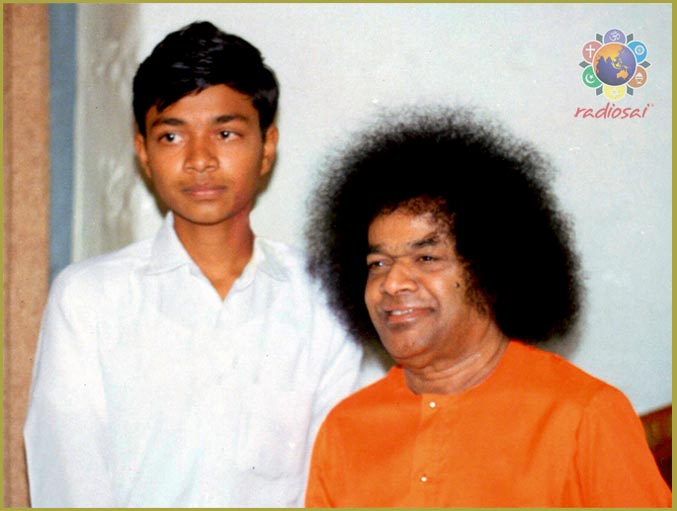 | |
| Mr Sathish Babu with Bhagawan in his student days |
Even as the students began to assemble in the Institute auditorium for the practice, Shailesh and Kumar hurriedly rehearsed the song. Kumar was brought up to speed with the Hindi and English portions. The Telugu part remained and there were less than 15 minutes for the practice session to begin. Shailesh sang out a tune for the first line spontaneously, “Neevu Leni Ma Jeevanam”.
Kumar seemed to be in a divine sync as he sang out the next line, equally spontaneously, “Neeru Leni Chepa Vedanam”.
The duet continued as Shailesh added, “Nee Sannidhe Maku Pennidhi”.
Not to be left behind, Kumar came up extemporaneously, “Needu Choope Prana Samanam… Neeku Maku Oke Bandhamu”.
The last line was not in metre! What was to be done?
At precisely this time, they received hurried summons from the warden who said that nearly six hundred students were waiting for the practice session. An inspired Kumar seemed to just speak out the last line - "Adhiye Prema Bandhamu". There was no beat but it built up to an excellent crescendo.
Kumar seemed to be in a divine sync as he sang out the next line, equally spontaneously, “Neeru Leni Chepa Vedanam”.
The duet continued as Shailesh added, “Nee Sannidhe Maku Pennidhi”.
Not to be left behind, Kumar came up extemporaneously, “Needu Choope Prana Samanam… Neeku Maku Oke Bandhamu”.
The last line was not in metre! What was to be done?
At precisely this time, they received hurried summons from the warden who said that nearly six hundred students were waiting for the practice session. An inspired Kumar seemed to just speak out the last line - "Adhiye Prema Bandhamu". There was no beat but it built up to an excellent crescendo.
Since there was no time to discuss or debate, they agreed on the tune and walked to the auditorium. In hindsight, it is nothing short of a miracle that the most poignant lines of an eternal golden song were penned in minutes! As Shailesh would recollect years later, “It was as if Swami who had provided the inspiration and lyrics for the song, wanted the tune to be beautiful in its simplicity. But that simplicity would have been lost if there was time to think. Thus, the Master of time squeezed His children with the lack of time to ensure the simple beauty and beautiful simplicity of the song were retained!”
Thus it was that spontaneously and almost effortlessly, the song was born. Just like the birth of the Avatar, the song was also born via Pravesha (entry) and not Prasava (conception).
Thus it was that spontaneously and almost effortlessly, the song was born. Just like the birth of the Avatar, the song was also born via Pravesha (entry) and not Prasava (conception).
He is the One who does, He is the One who enjoys
The practice sessions began and all the students from the school and college were taught the song. It was at this point that a student who was part of the music group, Rajesh Singh pointed out to Shailesh, "Sir, how can it be 'Sason Ki Dhadkan'? It should be the beat of the heart and not of the breath." Immediately, the change in lyrics happened and the third line of the song now became Dilon Ki Dhadkan Tum Ho Sai (You Sai, are the rhythm of our heart - verily our heartbeat itself).
As the session proceeded, Shailesh felt that it would probably be difficult to synchronise and sing the last line together as it lacked a beat. Kumar also agreed. But they were in for a pleasant shock! The entire group of 600-odd boys, all sang in perfect unison as if the last line had been timed with the invisible beat of the Universe itself. How could they not sing the line which proclaimed their only connect with their Swami? The practice session itself was so thrilling. Though Swami was keeping His distance, everyone felt as if Swami was present in their midst that day. (And indeed He was, as He later revealed.)
As the Guru Poornima evening approached, Dil was informed that the group song was ready and all the students were ready to sing it the moment Bhagawan arrived on to the stage. Now came the dilemma. Should he inform Bhagawan before itself about the group song or surprise Him by just singing it?
The odds were if they surprised Bhagawan with the song without informing in prior, Bhagawan might stop the song with a wave of His hand! Then all the efforts would go in vain and all the students would be disappointed and sad. But if Dil informed Bhagawan about the song then Swami might get upset as the conversation was a private one in His room. To add to the complication, KBR Prasad sir who was in-charge of the audio system, would not turn on the microphones unless prior permission had been obtained from Swami!
Once again, Dil prayed to Swami in his heart and Sainath provided the solution! Sainath was another alumnus who was serving Swami but was not privy to the conversation or the note. "Sainath, the students have prepared a song. Can you pray to Swami on their behalf before Swami went on stage?"
Sainath agreed and sought Swami's permission even as He got ready to go on stage. Swami’s reaction was casual and straight - "Aa, padukomanu. Kottademi kadu, nenu vinnanu idivaraku. (Yes, tell them to sing. It is not something new. I have heard it.)"
It would only be in retrospect that everyone would realize it was Swami who helped conceptualize the song, compose it and sing it through His students, His instruments.
As the Guru Poornima evening approached, Dil was informed that the group song was ready and all the students were ready to sing it the moment Bhagawan arrived on to the stage. Now came the dilemma. Should he inform Bhagawan before itself about the group song or surprise Him by just singing it?
The odds were if they surprised Bhagawan with the song without informing in prior, Bhagawan might stop the song with a wave of His hand! Then all the efforts would go in vain and all the students would be disappointed and sad. But if Dil informed Bhagawan about the song then Swami might get upset as the conversation was a private one in His room. To add to the complication, KBR Prasad sir who was in-charge of the audio system, would not turn on the microphones unless prior permission had been obtained from Swami!
Once again, Dil prayed to Swami in his heart and Sainath provided the solution! Sainath was another alumnus who was serving Swami but was not privy to the conversation or the note. "Sainath, the students have prepared a song. Can you pray to Swami on their behalf before Swami went on stage?"
Sainath agreed and sought Swami's permission even as He got ready to go on stage. Swami’s reaction was casual and straight - "Aa, padukomanu. Kottademi kadu, nenu vinnanu idivaraku. (Yes, tell them to sing. It is not something new. I have heard it.)"
It would only be in retrospect that everyone would realize it was Swami who helped conceptualize the song, compose it and sing it through His students, His instruments.
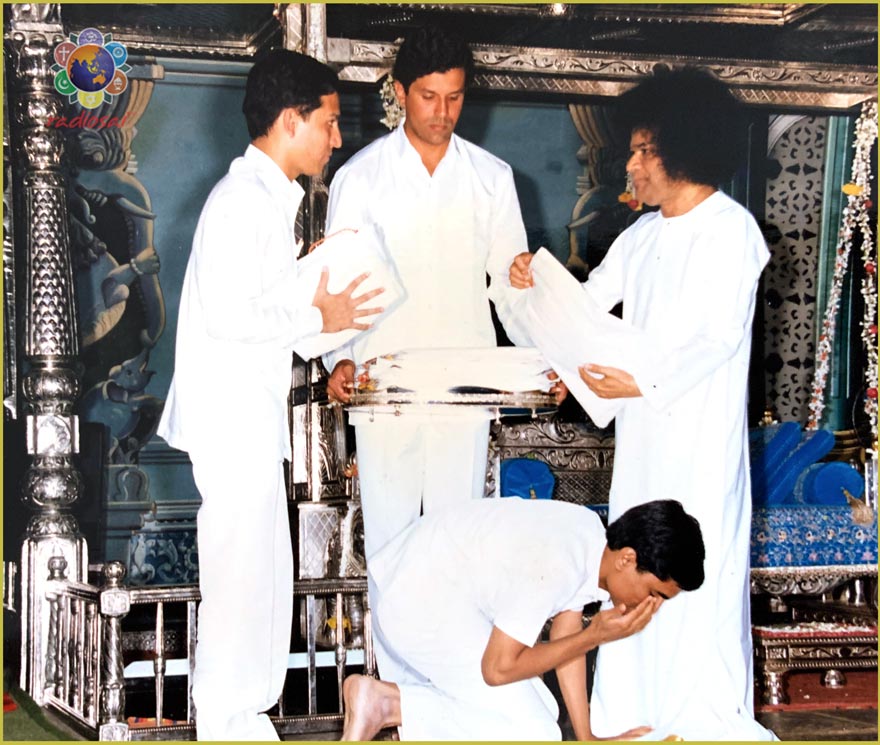 |
| Mr S Kumar (standing and receiving from Bhagawan) after one of the performances during Swami's Birthday. |
The Song and the Response
On that unforgettable day, Swami entered the auditorium and sat on the dais. There were the few speeches by Dr. Michael Goldstein, Mr. James Sinclair and Mr. Ajit Haksar. Speeches were the usual practice before Bhagawan’s discourse. However, just before the discourse, the pleading voice of a little child to its mother filled the air,
“Sunlo.... Dil Ki Pukar... Sunlo...” (Listen to the call of the heart... Listen to it.)
Swami sat still. He had permitted the students to sing and so, was not surprised. But the whole crowd that had gathered didn’t expect this and they watched on with bated breath as the students cried out, “Oh! How much we love You Lord! - Humko Tumse Pyar Kitna.”
Swami sat swaying to the lilting melody oozing with love from every side. Swami was lost, but lost in a different sense - one that the students loved. The devotees seemed to feel bad that they were not aware of the lyrics. Just at that moment, came the lines, “We love You dearest Sai, we love You.”
“Sunlo.... Dil Ki Pukar... Sunlo...” (Listen to the call of the heart... Listen to it.)
Swami sat still. He had permitted the students to sing and so, was not surprised. But the whole crowd that had gathered didn’t expect this and they watched on with bated breath as the students cried out, “Oh! How much we love You Lord! - Humko Tumse Pyar Kitna.”
Swami sat swaying to the lilting melody oozing with love from every side. Swami was lost, but lost in a different sense - one that the students loved. The devotees seemed to feel bad that they were not aware of the lyrics. Just at that moment, came the lines, “We love You dearest Sai, we love You.”
With rapturous joy, everyone joined in to proclaim man’s eternal bond with God. Then came the climax - the Telugu portion which ended with the unforgettable crescendo. Swami was delighted! It appeared as though He wanted to hold everyone in His loving embrace. Eyes moistened, and hearts melted. And in that instant, the worst of times had heralded the best of times. The winter of despair had yielded to the spring of hope and the season of darkness had vanished before the season of light!
It was a poignant moment and everyone’s heart was warm with love for Swami. Swami also seemed so touched. In fact, Swami would go on to even make a reference to the song in His Guru Poornima discourse, and also acknowledge the students’ prayers and Sadhana during the period when they thought Swami seemed distant and upset.
In fact, He said, “And, now, about our students; you may compare them with anybody, you cannot find anyone like them anywhere. Our students have been offering prayers every day, observing fasts, and thinking day and night, without, food or drink... They are in anguish and distress. Are there not likely to be a few stones in a bag of rice? In a big group there may be a few black sheep. On account of a few wrongdoers, it is not right to blacken all the students. Our students are like pure refined gold. They are prepared to do anything for Swami's sake. You have all listened to the song sung by a young lad at the beginning of the function. He sang; "We are ready to offer our lives to You, Bhagawan."
In fact, He said, “And, now, about our students; you may compare them with anybody, you cannot find anyone like them anywhere. Our students have been offering prayers every day, observing fasts, and thinking day and night, without, food or drink... They are in anguish and distress. Are there not likely to be a few stones in a bag of rice? In a big group there may be a few black sheep. On account of a few wrongdoers, it is not right to blacken all the students. Our students are like pure refined gold. They are prepared to do anything for Swami's sake. You have all listened to the song sung by a young lad at the beginning of the function. He sang; "We are ready to offer our lives to You, Bhagawan."
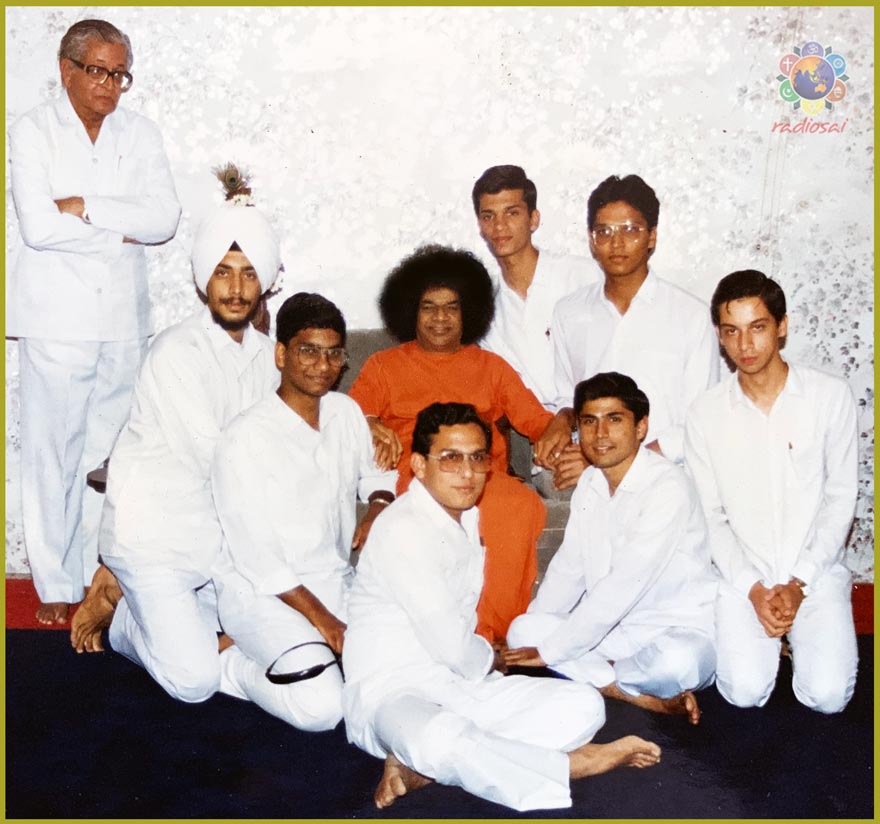 |
When Swami returned to Brindavan after a few days, the students there ‘surprised’ Him with this song (and a few other songs as well) bang in the middle of a Bhajan Session. A broad smile beamed on the divine countenance. That Bhajan session marked the beginning of the end of Swami keeping away from the boys! In fact, on a few occasions, Swami Himself began to ask for the song through a sweet question,
“Humko Tumse Pyar Kitna?” (The same words can also be read as, “How much love do I have for you?”)
The boys needed no further prodding to burst out with the song.
“Humko Tumse Pyar Kitna?” (The same words can also be read as, “How much love do I have for you?”)
The boys needed no further prodding to burst out with the song.
Is it any surprise that in one of the final-ever Convocation ceremonies to be held in His physical presence, when Bhagawan asked the students to sing a song, they burst forth with ‘Humko Tumse Pyar Kitna’? And within a few lines itself, everyone’s heart was overflowing with love for Swami. How can the Divine Heart withstand such love? It too began to overflow, and Swami sang out the Telugu line - Adiye Prema Bandhamu. It was as if He too was reaffirming to His students,
“My life without you is like the condition of the fish outside water. My greatest wealth is proximity to you and your gaze on Me is equal to life itself. There is only one bond that holds us together. And that, is the bond of love.”
“My life without you is like the condition of the fish outside water. My greatest wealth is proximity to you and your gaze on Me is equal to life itself. There is only one bond that holds us together. And that, is the bond of love.”
It is through the gloom of hopelessness that grace shines, it is bitterness that enables us to appreciate sweetness. So too, it is in distance we discover dearness. But the secret is to want God in pain and pleasure. When we seek God for the pleasures, He can grace us with, moments of pain will loosen our grip. But when we seek God and God alone, moments of pain will only make us grip His hand more firmly. This song was an expression of that firm grip, the deeper craving and tearful assertion. Every time we sense a distance growing between us and Swami, may we burst forth in this melody, and let the image of Swami responding to these heartfelt words come before our minds eyes and soothe the ailing heart!
This timeless melody celebrates its silver jubilee this year, and it is another sign of Swami’s love that we were inspired to share the history behind this song now, as the year ends and when former students of Swami are gathering to celebrate the annual 'Prema Bandham - Alumni Meet'.
Thousands of students have expressed their unspeakable love for Swami through this melody. Thousands of devotees speaking various languages have found delight in singing this to Him. This is indeed a special song about a special bond Swami has so graciously permitted us to forge with Him. May this song be sung by millions more and by multitude of generations. And we pray that with every passing day, let our love for Swami become more and more true as expressed in this melody!
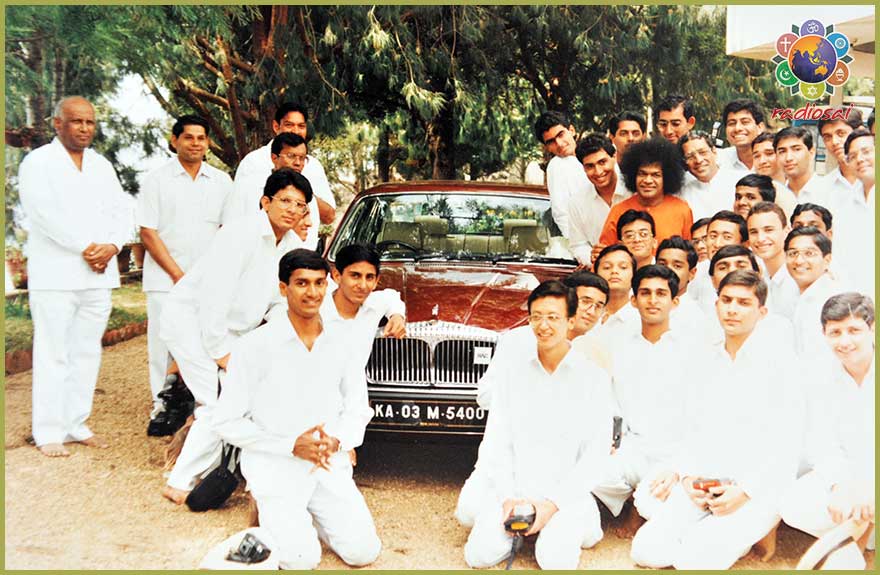 |
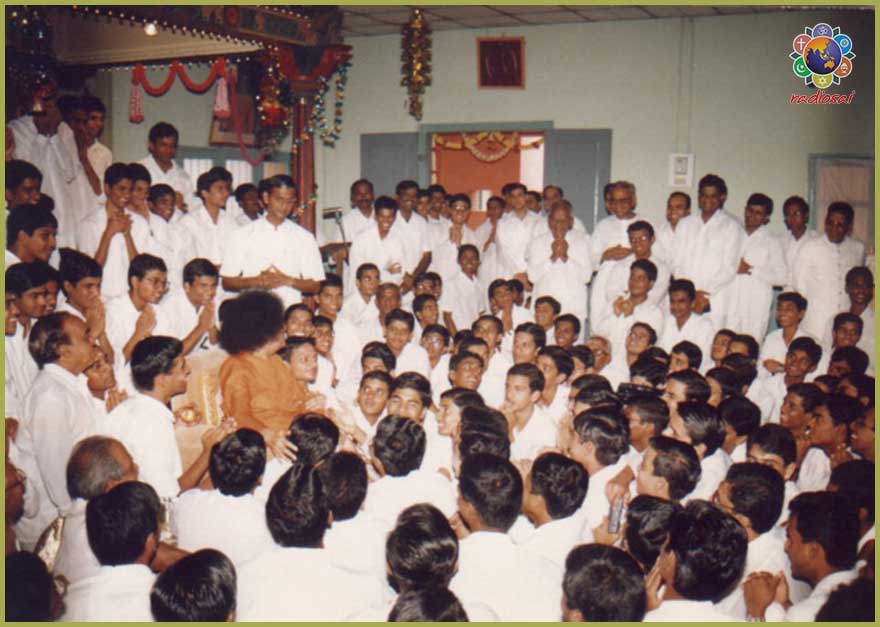 |
Lyrics:
Humko Tumse Pyar Kitna (How much we love You...)
Sai Tum Hi Jante Hain (...is something that You alone know dear Sai)
Dilon Ki Dhadkan Tum Ho Sai (You Sai, are the rhythm of our heart - our heartbeat itself)
Tum Hamare Pran Ho (You are our life)
Humko Tumse Pyar Hain. (We love You so much)
We love You dearest Lord, we love You.
We love You dearest Lord, we love You.
Neevu Leni Ma Jeevanam (Our life without You,)
Neeru Leni Chepa Vedanam (is like the plight of a fish without water.)
Nee Sannidhe Maku Pennidhi (Proximity to You is our greatest wealth)
Needu Choope Prana Samanam (One glance from You is as dear as life itself)
Neeku Maku Oke Bandhamu (Only one bond exists between You and us,)
Adhiye Prema Bandhamu (and that is the bond of love.)
Humko Tumse Pyar Kitna (How much we love You...)
Sai Tum Hi Jante Hain (...is something that You alone know dear Sai)
Dilon Ki Dhadkan Tum Ho Sai (You Sai, are the rhythm of our heart - our heartbeat itself)
Tum Hamare Pran Ho (You are our life)
Humko Tumse Pyar Hain. (We love You so much)
We love You dearest Lord, we love You.
We love You dearest Lord, we love You.
Neevu Leni Ma Jeevanam (Our life without You,)
Neeru Leni Chepa Vedanam (is like the plight of a fish without water.)
Nee Sannidhe Maku Pennidhi (Proximity to You is our greatest wealth)
Needu Choope Prana Samanam (One glance from You is as dear as life itself)
Neeku Maku Oke Bandhamu (Only one bond exists between You and us,)
Adhiye Prema Bandhamu (and that is the bond of love.)
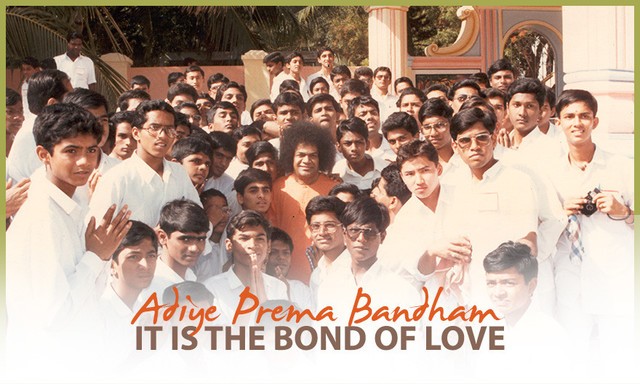
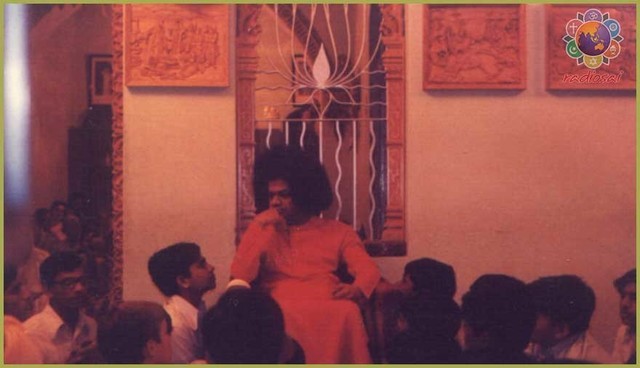
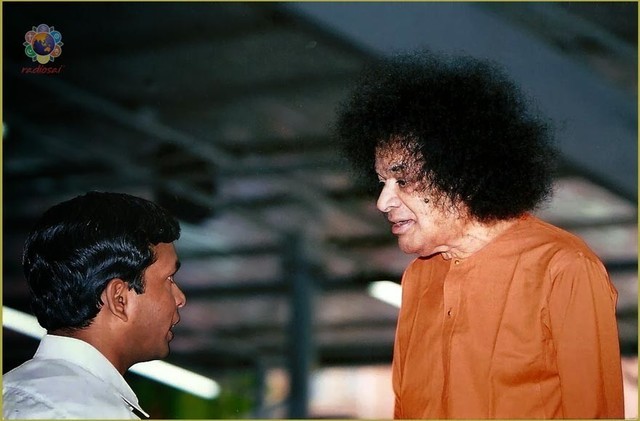
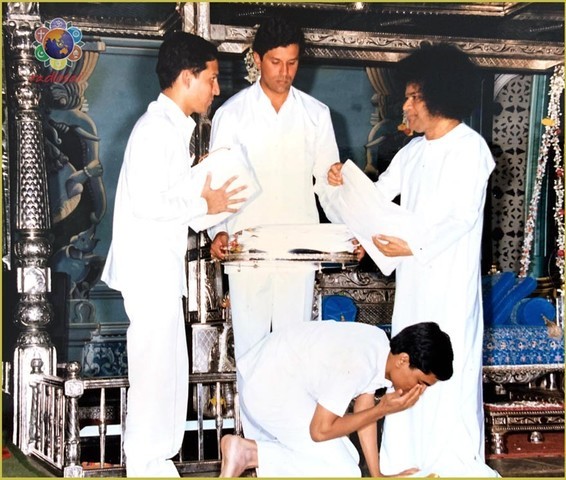
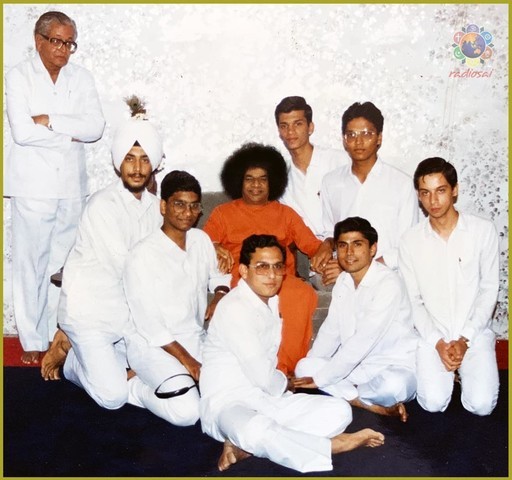
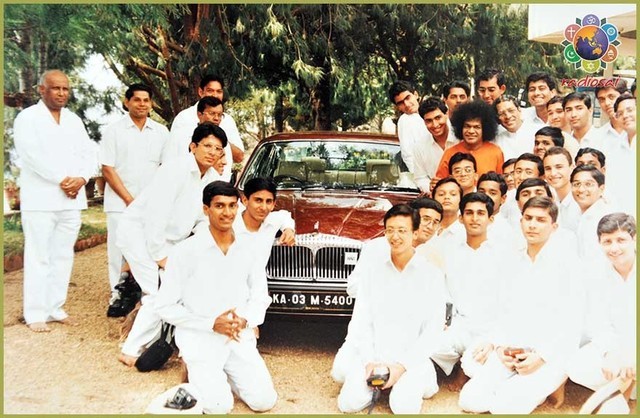
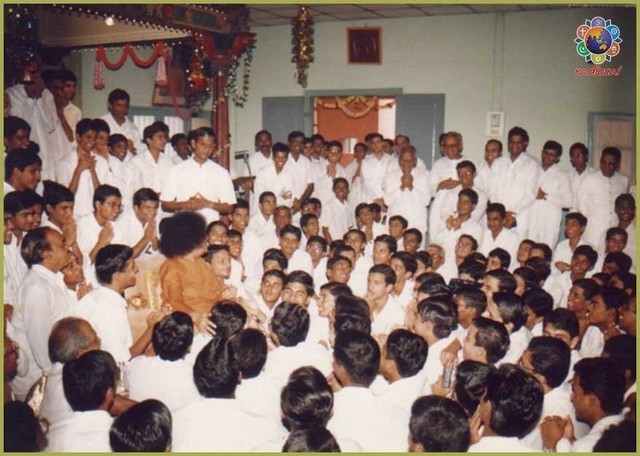
Комментариев нет:
Отправить комментарий